Starting on a ketogenic diet involves a significant reduction in carbohydrate intake, and replacing it with fat, which leads to a metabolic state known as ketosis. During ketosis, the body becomes incredibly efficient at burning fat for energy, a change that can support weight loss efforts. However, adhering to a low-carb regime doesn’t mean one must give up sweeteners altogether. Instead, individuals on a keto diet can choose from a range of sweeteners that have minimal effect on blood sugar levels.
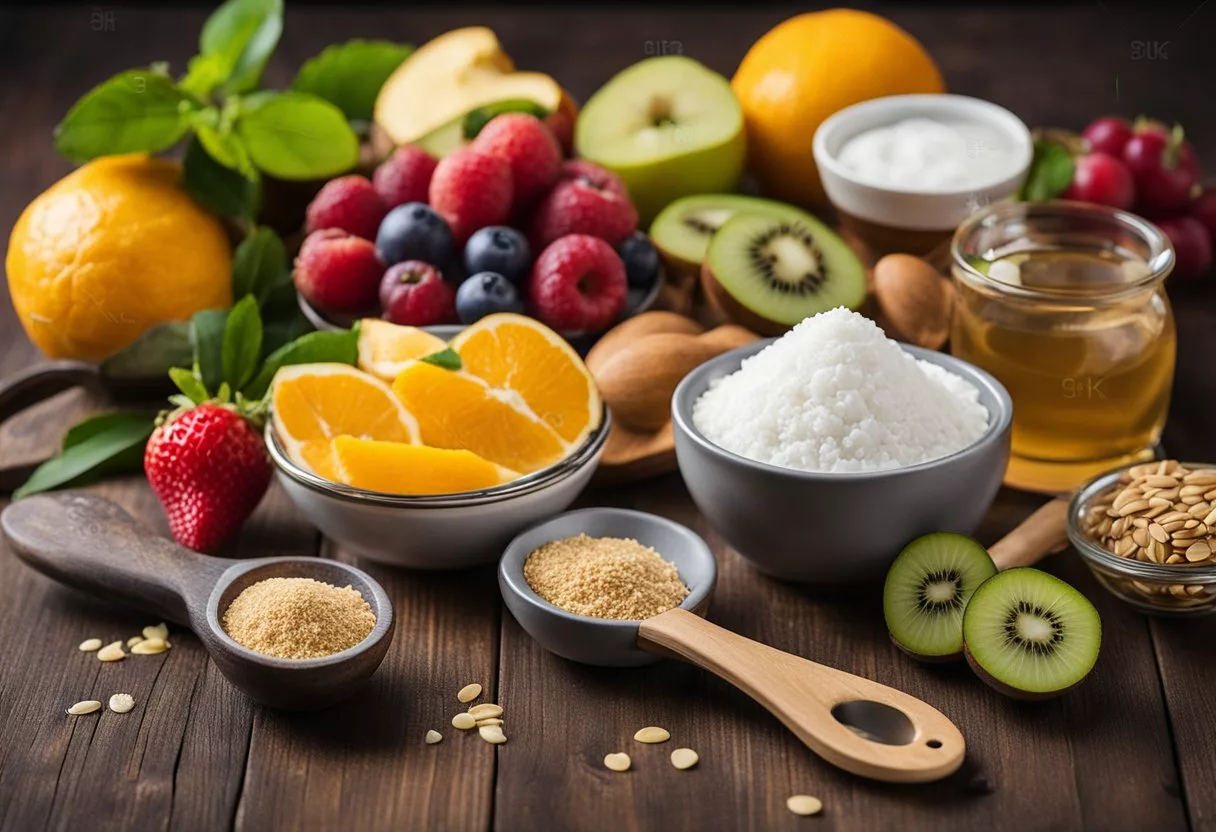
Selecting the right sweeteners is basic for maintaining ketosis and achieving desired weight loss goals. Natural sweeteners such as stevia and erythritol have gained popularity among the keto community due to their low glycemic index and net carb content.
On the other hand, synthetic sweeteners like sucralose are also used by some keto adherents, although they can be controversial. Keto-friendly sweeteners allow individuals to enjoy a sweet taste without compromising their state of ketosis or stalling weight loss progress.
Understanding the properties and effects of various sweeteners can assist those following a ketogenic lifestyle to make informed choices. Sweeteners like monk fruit extract and xylitol are preferred options as they offer sweetness without adding substantial calories or sugars to the diet.
Each sweetener has unique characteristics; some may not cause a spike in blood glucose levels, while others might offer additional benefits like dental health improvement. It is vital for keto dieters to be discerning in their sweetener selection to ensure alignment with their nutritional goals and overall well-being.
Understanding Keto-Friendly Sweeteners
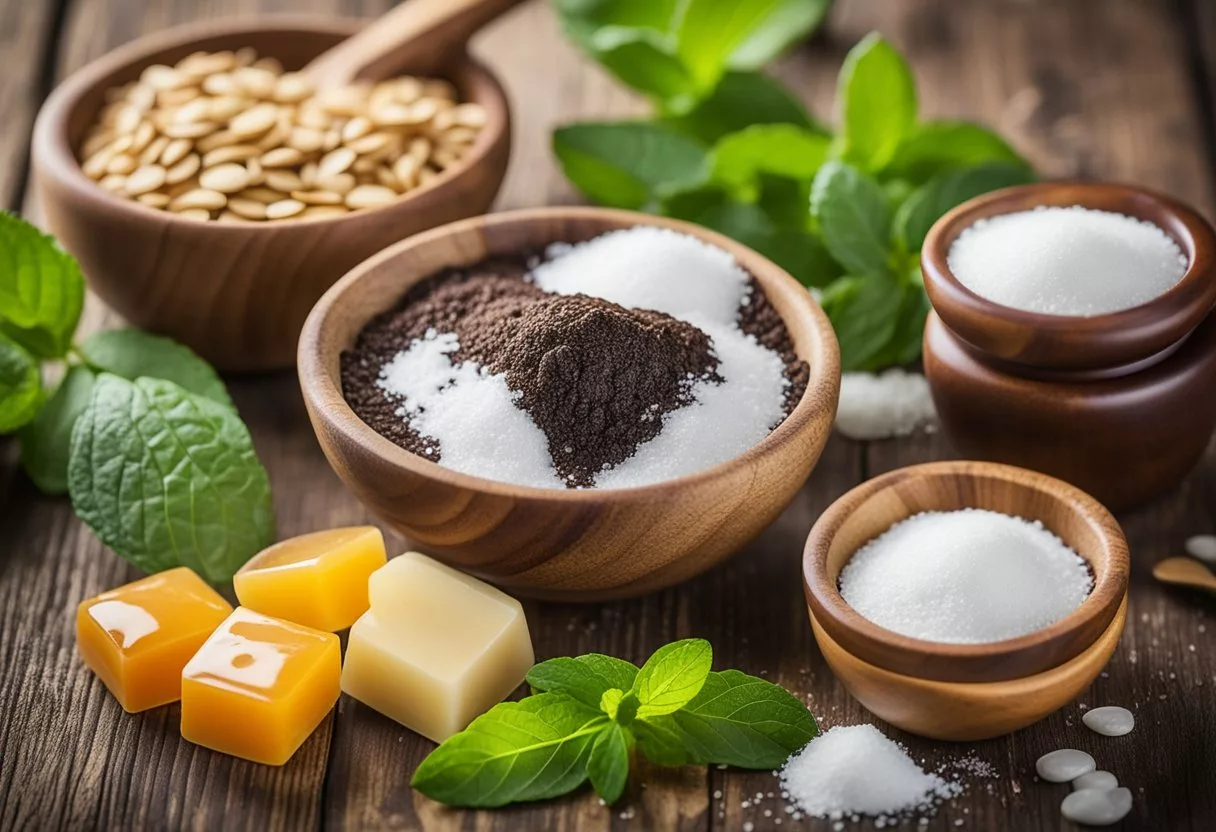
When embarking on a ketogenic diet, it’s crucial to understand the role of keto-friendly sweeteners as they impact ketosis and blood sugar levels. These substitutes play a significant part in sustaining a low-carb lifestyle without sacrificing sweetness.
Definition and Importance
Keto-friendly sweeteners are sugar substitutes that provide the sweetness of sugar without the high carbohydrate content, making them suitable for a ketogenic diet. They are essential for individuals looking to reduce their sugar intake while maintaining a state of ketosis, where the body burns fat for fuel instead of carbohydrates.
Common Types of Keto Sweeteners
Natural Sweeteners:
- Stevia: A zero-calorie sweetener derived from the leaves of the Stevia rebaudiana plant.
- Monk Fruit: Extracted from the monk fruit, offering high sweetness without calories or carbs.
Sugar Alcohols:
- Erythritol: A sugar alcohol with minimal impact on blood sugar, often used in baking.
- Xylitol: Another sugar alcohol, providing sweetness but can affect digestive systems if consumed in large amounts.
Artificial Sweeteners:
- Sucralose: A non-caloric artificial sweetener that is not metabolized by the body, making it keto-friendly.
Role in Ketosis and Low-Carb Diets
Keto-friendly sweeteners can help individuals adhere to the strict carbohydrate limitations of low-carb diets by replacing high-carb sugars. They allow for the enjoyment of sweet foods and beverages without exiting ketosis, thus supporting continued fat metabolism.
Impact on Blood Sugar Levels and Insulin Resistance
Most keto-friendly sweeteners have minimal or no impact on blood sugar levels, making them suitable for those managing diabetes or insulin resistance. Unlike regular sugar, they typically don’t cause a significant insulin response, which is essential for maintaining stable blood sugar and aiding in weight management within a ketogenic dietary framework.
Popular Keto Sweeteners and Their Properties
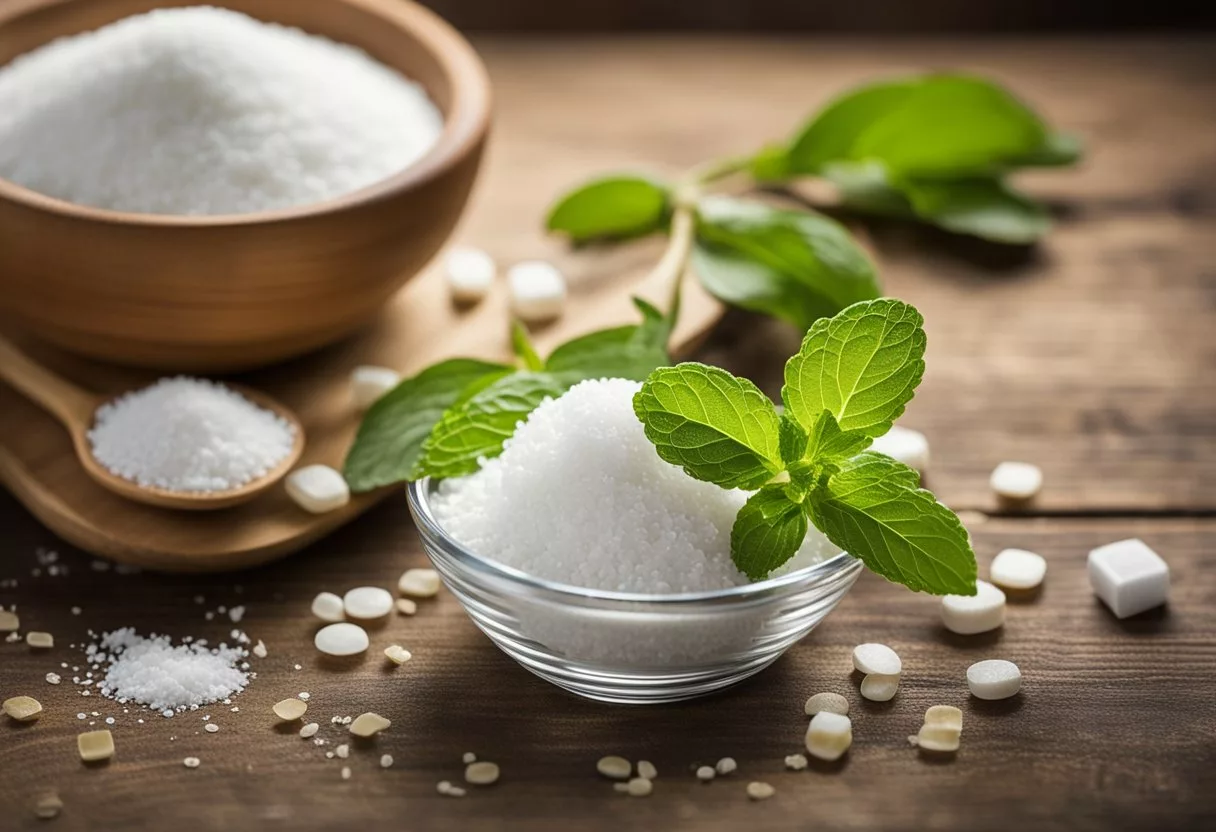
When adhering to a ketogenic diet, it is crucial to select sweeteners that have minimal impact on blood glucose levels. The following sweeteners are commonly used in the keto community due to their low net carb content and ability to mimic sugar’s sweetness.
Stevia
Stevia, a natural sweetener derived from the leaves of the Stevia rebaudiana plant, is notable for its zero-calorie content and ability to be up to 300 times sweeter than sugar. It contains compounds called steviol glycosides, which have a negligible effect on blood glucose, making it suitable for a keto diet.
Erythritol
Erythritol falls into the category of sugar alcohols and is greatly favored because it has almost no calories and does not raise blood sugar levels. Erythritol is approximately 70% as sweet as sugar but has a cooling aftertaste that some find pleasant.
Monk Fruit
The sweetener from the monk fruit, or luo han guo, owes its sweetness to natural compounds called mogrosides. Monk fruit extract can be up to 200 times sweeter than sugar and has zero net carbs, making it an excellent choice for the ketogenic diet without any significant aftertaste.
Xylitol and Other Sugar Alcohols
Xylitol is another sugar alcohol with a sweetness comparable to sugar. However, it contains a low but non-zero caloric and carb content, which can slightly affect blood sugar levels. Individuals should note that xylitol can cause digestive discomfort if consumed in excess.
Unique Attributes of Sucralose and Aspartame
Sucralose is an artificial sweetener that is non-nutritive and does not contain carbs. Its intense sweetness means that it is often used in small quantities. Aspartame, another artificial sweetener, is approximately 200 times sweeter than sugar. Both have a minimal impact on blood sugar levels but should be consumed in moderation due to their artificial nature.
Health Impacts of Sweeteners in a Keto Diet
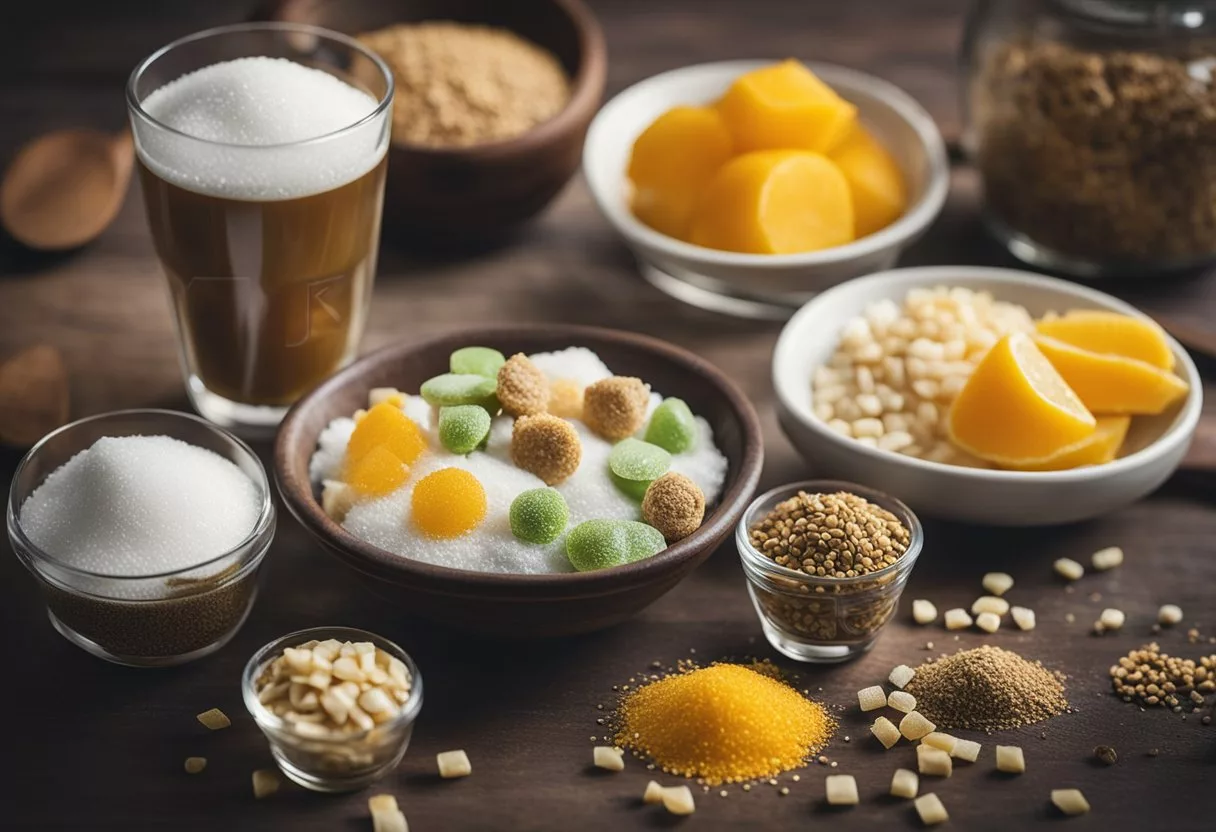
Sweeteners play a significant role in a ketogenic diet by offering a low-carb alternative to sugar. However, their effect on weight loss, metabolic health, and the risk of side effects varies depending on the type used.
Weight Loss and Management Expectations
Sweeteners on a keto diet can influence weight management in several ways. Firstly, they generally contain fewer calories than sugar, which can contribute to a caloric deficit necessary for weight loss. For instance, sweeteners like stevia and erythritol have nearly zero calories. Secondly, by not spiking blood sugar levels, non-glycemic sweeteners may help prevent the cycles of cravings and overeating associated with regular sugar consumption. However, individuals may experience varying responses to sweeteners, and some might not find them helpful for weight loss.
Potential Benefits on Metabolic Health
Certain keto-friendly sweeteners may have a neutral or positive effect on metabolic health. They typically have a minimal impact on blood sugar and insulin levels, which is particularly beneficial for individuals managing diabetes. Options like stevia and sucralose do not contribute to high carbohydrate intake, which supports the fundamental low-carb approach of the keto diet. There is also some evidence to suggest that sugar alternatives could improve certain metabolic markers, though studies are not conclusive for all sweeteners.
Risks and Side Effects of Sweeteners
While sweeteners are useful for adhering to a low-carb diet, they may pose risks or cause side effects. Some artificial sweeteners could potentially disrupt gut health, leading to digestive issues. Additionally, the perception of sweetness could still trigger insulin responses in some people, potentially impacting metabolic health despite the absence of sugar. It’s important for individuals to monitor their tolerance and any adverse effects when consuming sweeteners and to choose those that align best with their health goals.
Regulatory and Safety Considerations
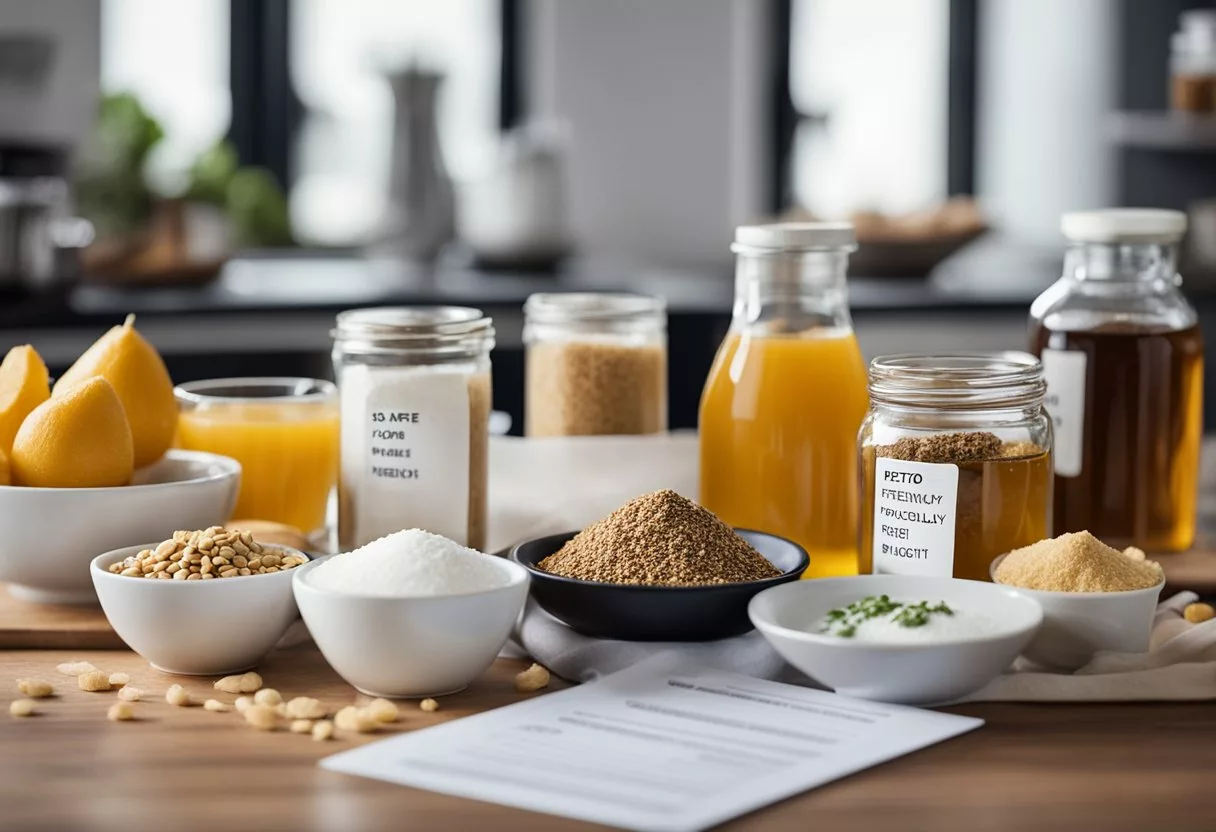
When considering keto-friendly sweeteners, one must take into account the regulatory status and safety assessments overseen by the Food and Drug Administration (FDA). Two crucial aspects to consider are the FDA’s stance on these sweeteners and their classification under the Generally Recognized as Safe (GRAS) standard.
FDA’s Stance and GRAS Status
The FDA is the regulatory body responsible for overseeing the safety of food additives, including non-nutritive sweeteners. It has approved several low-calorie sweeteners for use in the food supply. These sweeteners, such as saccharin and sucralose, have been evaluated for safety and must meet the criteria to be labeled as GRAS. To achieve GRAS status, a substance must have evidence of safety through scientific review and common use in foods without adverse effects.
- Approved Keto-Friendly Sweeteners by the FDA:
- Saccharin: Commonly used in “Sweet N Low”, deemed safe for the general population.
- Sucralose: Found in products like “Splenda”, well-researched and accepted for use.
- Steviol Glycosides: Extracts from the stevia plant, suitable for keto enthusiasts.
- Acesulfame K: Often blended with other sweeteners, recognized as safe by FDA.
The FDA maintains a list of these approved additives and continuously evaluates new research to ensure ongoing safety.
Examining Keto Sweeteners’ Generally Recognized as Safe (GRAS) Classification
The GRAS classification is a legal standard the FDA uses to designate ingredients as safe under the conditions of their intended use. Keto-friendly sweeteners with such a classification do not require a pre-market review by the FDA.
For a sweetener to be GRAS, ample evidence must show that its consumption is safe for the intended population. Scientific consensus is essential for this classification, often involving studies on metabolism, toxicology, and allergenicity.
- Requirements for GRAS Classification:
- Expert Scientific Consensus: Agreement in the scientific community regarding the safety of the substance.
- Evidence of Safety: Research studies, including human and animal testing.
- Historical Use: Safe consumption over time can contribute to GRAS status.
To date, certain sweeteners like steviol glycosides and Lo Han Guo (monk fruit) received approval through the GRAS pathway. The rigorous process ensures that the use of these sweeteners in a ketogenic diet aligns with recognized safety standards.
Incorporating Sweeteners into Keto Recipes and Meal Plans
Selecting the right sweeteners is essential for maintaining the balance of a ketogenic diet while still enjoying a variety of flavors. This section explores how to infuse keto-friendly sweeteners into beverages, baked goods, and everyday cooking without compromising the low-carb ethos of keto meal plans.
Crafting Keto-Friendly Beverages
One can easily sweeten keto beverages without adding extra carbohydrates. Using sweeteners such as stevia or erythritol, which both have zero net carbs, is ideal for coffee, tea, and homemade keto-friendly smoothies. Liquid forms of these sweeteners blend easily and provide a homogenous sweetness. Here is an example recipe:
- Keto Lemonade: Combine 1 cup of water, freshly squeezed juice from 2 lemons, and liquid stevia to taste. Mix well and add ice if desired.
Designing Low-Carb, Sweetened Baked Goods
When creating low-carb baked goods, the choice of sweetener plays a critical role in both taste and texture. Powders or granulated forms of sweeteners such as erythritol or monk fruit blend mimic the properties of sugar, which is helpful in recipes for items like cookies or cakes. They can usually be substituted at a 1:1 ratio for sugar but check each sweetener’s recommendations. Here’s a brief guide for substituting sweeteners in baking:
| Sugar | Substitute with: |
|---|---|
| 1 cup | 1 cup erythritol |
| 1 tsp | 1 tsp stevia |
Keto Sweeteners in Everyday Cooking
Meal preparation within a ketogenic framework can extend beyond sweets and treats. Sweeteners find their place in enhancing flavors in salad dressings, marinades, and sauces. A dash of a powdered or liquid keto-approved sweetener can balance the acidity in salad dressings or add a touch of sweetness to homemade barbecue sauces without increasing carb counts significantly. For example:
- Keto Salad Dressing: Whisk together 3 tablespoons of olive oil, 1 tablespoon of vinegar, erythritol to taste, and a pinch of salt and pepper for a quick and easy keto dressing.
Considerations for Sweetener Selection based on Nutritional Profiles
When selecting a keto-friendly sweetener, it is crucial to analyze its nutritional profile, specifically focusing on calorie and carbohydrate content, glycemic index, and overall nutritive value to ensure it aligns with weight loss goals and dietary restrictions.
Caloric and Carbohydrate Content Analysis
- Calories: A sweetener suitable for a ketogenic diet should ideally have minimal to zero calories. Zero-calorie sweeteners like stevia and sucralose are favorable as they do not contribute to daily caloric intake.
- Carbohydrates: Sweeteners such as erythritol and monk fruit have zero or negligible net carbs, making them appropriate for maintaining ketosis.
| Sweetener | Calories per Teaspoon (approx.) | Net Carbs (g) |
|---|---|---|
| Erythritol | 0-6 (very low) | 0 |
| Xylitol | 10 | 0-0.5 |
| Stevia | 0 | 0 |
| Monk Fruit | 0 | 0 |
Glycemic Index Factors
The glycemic index (GI) measures how quickly foods raise blood sugar levels. For a ketogenic diet, one’s aim should be to incorporate sweeteners with a glycemic index of zero, indicating no impact on blood sugar. Erythritol and monk fruit sweeteners are examples of having a negligible effect on blood glucose levels.
Nutritive Value and Health Benefits
Nutritive sweeteners may contribute vitamins, minerals, or other beneficial compounds:
- Fiber: Some sweeteners, like yacon syrup, contain fiber, which can assist with digestion and satiety.
- Antioxidants: Certain sweeteners, such as monk fruit, have antioxidants, which may offer health benefits unrelated to their sweetness.
It’s important for individuals to consider the nutritional facts of sweeteners and how they align with their health and wellness objectives when making selections. Fiber can be useful on a ketogenic diet for maintaining gut health, while antioxidants contribute to overall well-being. Protein is generally not a consideration when selecting sweeteners, as they are not a significant source of protein.
Sweeteners and Consumer Preferences
Different sweeteners carry distinct taste profiles and potential benefits that align with consumer preferences, especially within the context of a ketogenic diet which emphasizes low carbohydrate intake. Consumers tend to prioritize taste, potential health benefits, and culinary adaptability when selecting sweeteners.
Taste Profiles and Culinary Application
Stevia and erythritol are popular for their similarity to sugar’s taste and their versatility in cooking and baking. These sweeteners provide a sweet taste with minimal to zero impact on blood sugar levels, making them suitable for ketogenic recipes. Their taste profiles allow for direct substitution in many recipes, though erythritol may have a cooling aftertaste and stevia can have a bitter note if used in large quantities.
- Monk fruit sweetener exhibits a sweetness that can be up to 250 times stronger than sugar, requiring consumers to adjust their usage accordingly.
- Sucralose is another strong sweetener, often used in commercial low-carb products due to its stability under high temperatures.
Addressing Consumer Sweet Preferences
Consumers gravitate towards sweeteners that closely mimic the sweetness of sugar without contributing to carbohydrate intake. They have shown a preference for sweeteners that can be measured and used like sugar, which is why many opt for granulated forms of stevia or erythritol. Liquid sweeteners, such as monk fruit extract, also satisfy consumer preferences for ease of use, especially in beverages.
- Individuals following a ketogenic diet often give priority to sweeteners that have a glycemic index of zero, such as erythritol, monk fruit, and stevia.
The Psychology Behind Sweetness and Sugar Cravings
Sweetness often serves as a satisfying conclusion to a meal and fulfills sensory cravings. Consumers not only seek out the pleasurable taste but also the emotional response associated with sweetness. Sugar cravings are rooted in both biology and habit, and as individuals reduce sugar consumption, they often look for alternative sweeteners to fill the gap.
- The use of keto-friendly sweeteners can align with consumer’s desires for sweetness while helping maintain the dietary restrictions of the ketogenic lifestyle.
Comparing Natural and Artificial Keto Sweeteners
When looking at keto-friendly sweeteners, one needs to assess both natural and artificial options, considering their impact on health and weight loss.
Exploring Natural Sweeteners Like Stevia and Monk Fruit
Stevia and monk fruit are natural, non-nutritive sweeteners popular within the ketogenic community. Stevia, derived from the leaves of the Stevia rebaudiana plant, and monk fruit, from the Siraitia grosvenorii fruit, both have a sweetening power significantly higher than sugar, yet they contribute minimal to no calories and have negligible effects on blood glucose levels.
- Stevia: Exhibits a sweetness 200 to 300 times that of sugar.
- Monk Fruit: Can be up to 250 times sweeter than sugar.
Both of these natural sweeteners are considered safe for consumption and are often recommended for those on a ketogenic diet due to their low carbohydrate content.
Artificial Sweeteners: Uses and Concerns
Artificial sweeteners, like sucralose and aspartame, are synthetic sugar substitutes. They are widely used due to their low-caloric content and intense sweetness. Sucralose is approximately 600 times sweeter than sugar and is typically used in baking and packaged foods due to its stability at high temperatures. Aspartame, on the other hand, is about 200 times sweeter than sugar with a different flavor profile and is not heat-stable, thus it’s more common in beverages and food products that are not subjected to high heat.
- Sucralose: Preferred for its stable properties when heated and versatile use.
- Aspartame: Suitable for cold dishes and beverages due to instability when heated.
While there is ongoing debate about the health impacts of artificial sweeteners, they are generally recognized as safe by regulatory bodies but should be consumed within the acceptable daily intake levels. Some people may experience adverse effects from artificial sweeteners, like digestive discomfort or changes in gut microbiota, and therefore, one’s individual response should be considered when incorporating these sweeteners into a ketogenic diet.
Common Concerns and Myths Debunked
In the context of a ketogenic diet, misconceptions about sweeteners are prevalent. This section aims to clarify the truth about sugar alcohols’ impact on blood sugar levels and address common misunderstandings regarding keto-friendly sweeteners and weight management.
Addressing the Myth of Sugar Alcohols and Blood Sugar
Sugar alcohols, such as erythritol and xylitol, are often used as low-carb substitutes for sugar. A myth persists that sugar alcohols significantly raise blood sugar levels, however, this is not universally true. Erythritol, for instance, has a minimal impact on blood sugar levels due to its low glycemic index. Xylitol, while having a higher glycemic index than erythritol, still has a lower impact on blood sugar than regular sugar. It’s essential to recognize that individual responses can vary, so monitoring personal blood sugar responses to specific sugar alcohols is prudent.
Clearing Up Confusions About Keto-Friendly Sweeteners and Weight Gain
The relationship between keto-friendly sweeteners and weight gain is frequently misunderstood. Sweeteners such as stevia, sucralose, and monk fruit don’t directly lead to weight gain as they generally contain minimal to no calories or carbohydrates. However, one should be mindful that any food or sweetener can potentially trigger overeating by stimulating cravings or a preference for sweet tastes. For weight management on a ketogenic diet, it’s important to consume these sweeteners in moderation to avoid potential indirect effects on weight.
Final Remarks on Keto Sweeteners and Diet Management
In managing a ketogenic lifestyle, individuals often explore keto sweeteners as an alternative to high-carb sugars. The goal is to maintain the state of ketosis while still enjoying sweet flavors. Keto-friendly sweeteners such as stevia, erythritol, monk fruit, and sucralose have emerged as popular choices due to their minimal impact on blood sugar levels.
It is essential to distinguish between these sweeteners and high-carb varieties like maltodextrin and honey, which can impede progress in a ketogenic diet. Diet management on keto involves meticulous tracking of carbohydrate intake, and incorporating the correct sweeteners supports this process.
- Recommended Keto Sweeteners:
- Stevia: Plant-derived and contains zero calories.
- Erythritol: Sugar alcohol with minimal calories and carbs.
- Monk Fruit: Natural sweetener with no calories or carbs.
- Sucralose: Artificial sweetener that should be used without bulking agents.
Inclusion of the appropriate sweeteners can be comfortable and beneficial, but moderation is key. They must fit within the overall macro nutrient framework of an individual’s diet plan. While they do not contribute significantly to caloric intake, the importance of whole, nutrient-rich foods remains paramount in a balanced keto diet.
Individuals should consider the broader implications of sweeteners beyond the immediate gratification they provide. They can affect appetite, eating habits, and sometimes digestion. Attention to such effects is crucial for maintaining a healthy weight and achieving desired fitness goals within the ketogenic lifestyle.
Frequently Asked Questions
Choosing the right sweeteners is essential for maintaining ketosis and achieving weight loss goals on a ketogenic diet. This section addresses common questions about the use of sweeteners while following a keto lifestyle.
What are the best sweeteners to use in coffee while following a ketogenic diet?
The best keto-friendly sweeteners for coffee are stevia, erythritol, and monk fruit sweetener. These have little to no effect on blood sugar levels and are suitable for a low-carb diet.
How does consuming sucralose affect ketosis and can it disrupt a keto diet?
While sucralose is a zero-carbohydrate sweetener, some individuals may experience an insulin response or a disruption in ketosis. It is considered acceptable in moderation but closely monitoring individual responses is recommended.
Which sweetener is recommended for individuals on a keto diet with diabetes?
Monk fruit and stevia are recommendable sweeteners for individuals with diabetes on a keto diet because they do not raise blood sugar levels.
Are there any sweeteners that I can use for baking without affecting my keto diet?
Erythritol and allulose are two sweeteners that can be used in baking. They both have a minimal impact on blood sugar and are heat-stable, making them excellent choices for keto-friendly baking.
Can the consumption of erythritol have side effects while on a ketogenic diet?
Erythritol is generally well-tolerated on a ketogenic diet, but some individuals might experience digestive discomfort if consumed in large amounts. It is important to consume erythritol in moderation.
What no-carb sweeteners are ideal for ensuring continued weight loss on keto?
Stevia, erythritol, monk fruit, and allulose are no-carb sweeteners that can aid in continued weight loss on a keto diet. They can be used to replace sugar without adding carbs.